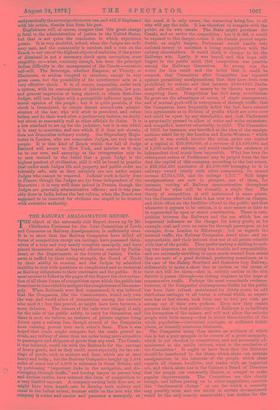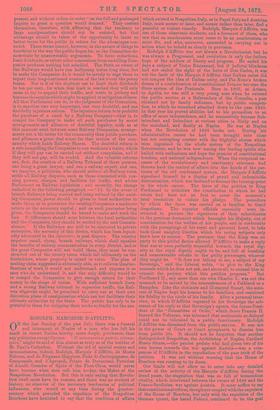THE RAILWAY AMALGAMATION REPORT.
THE object of the extremely able Report drawn up by Mr.
Chichester Forteseue for the Joint Committee of Lords and Commons on Railway Amalgamation, is sufficiently clear. It is to show that the Railway Companies have killed all forms of competition except sea carriage, have possessed them- selves of a true and very nearly complete monopoly, and have plated themselves almost beyond effective control by Parlia- ment, or the Departments, or the Courts of Justice. Parlia- ment is baffled by their voting strength, the Board of Trade by their ability in evasion, and the Judges by admitted inability to deal with questions so complicated and so technical as Railway obligations to their customers and the public. It is most curious to follow in the pages of the Report the slow extinc- tion of all those forms of competition upon which the public has from time to time relied to mitigate the completeness of the mono- poly. When Railroads were first commenced, it was believed that the Companies, like the Canal-owners, would only own the way, and would allow of competition among the carriers who used it ; but this proved, as might have been foreseen, a mere delusion. The owners of the rails were obliged, if only for the sake of the public safety, to carry for themselves, and there is now, we believe, no instance of private engines being driven upon a railway line, though several of the Companies have running powers over each other's lines. Then it was hoped that roads might compete, but the roads proved no rivals, any railway of more than ten miles being more attractive to passengers and shippers of goods than any road. The Canals, it was believed, could vie with the Railroads for the carriage of heavy goods, and so they could, more especially for the car- riage of goods, such as manure and lime, which are at once heavy and bulky ; but the Railway Companies bought up 1,544 miles of canal out of 4,000 in existence in Great Britain, and by purchasing "important links in the navigation, and dis- couraging through traffic," and forcing barges to pursue long and devious 'routes, have reduced this form of competition to a very limited amount. A company owning both does not, as might have been hoped, care to develop both railway and canal to the fullest extent, because while on the iron way the company is owner and carrier and possesses a monopoly, on
who will pay the tolls. It has therefore to compete with the public on its own canals. The State might purchase the Canals, and so revive the competition ; but if it did, it would be exposed to this danger,—that if the Canals proved unpro- fitable, as might happen, Parliament would hardly vote national money to maintain a losing competition with the railway shareholders. It would think it cheaper to let the Railways win. Lastly, it was hoped, and this hope still lingers in the public mind, that competition was possible among the Railways themselves. So strong was the desire for this result and the belief that it could be secured, that Committee after Committee has reported against permitting amalgamations, that they have been even prohibited by statute, and that between 1840-1846 Parlia- ment allowed millions of money to be thrown away upon competing lines. Competition has died away, nevertheless. So great are the advantages of union, of single management, and of mutual good-will in conveyance of through traffic, that the Companies have frequently defied the law, have entered into agreements as to division of profits which are extra aims and could be upset by any shareholder, and that Parliament is perpetually pressed to allow of wider and wider extensions, and compelled, however reluctantly, to yield. The Committee of 1853, for instance, was horrified at the idea of the amalga- mations asked for by the London and North-Western, "which would, it was stated, involve the union under one control of a capital of £60,000,000, of a revenue of £4,000,000, and of 1,200 miles of railway, and would render the existence of independent rival trunk lines impossible. What has been the subsequent action of Parliament may be judged from the fact that the capital of this company, according to the last return, is £62,952,436 (exclusive of £3,188,000 belonging to it in railways owned jointly with other companies), its annual income £7,014,703, and its mileage 1,507." Still larger amalgamations are now in prospect, one of them, for instance, vesting all Railway communication throughout Scotland in what will be virtually a single line. The theory of competition is still maintained in some places, but the Committee hold that it has now no effect on charges, and little effect on the facilities offered to the public, and that whenever it appears to be serious, it is sure sooner or later to be superseded by open or secret combination. There is com- petition between the Railways and the sea which has an important influence on the charges for heavy goods, as, for example, coal, and even on rates for through passengers, as, for example, from London to Edinburgh ; but as regards the internal traffic, the Railway Companies stand alone and un- approachable, and their interest does not at all points coincide with that of the public. They prefer making a shilling to mak- ing two sixpences, as involving less trouble and responsibility, and are extremely unwilling to open much-wanted lines unless they are sure of a good dividend, preferring sometimes, as in the case of the Bishop Stortford and Braintree loop Railway, deliberately to make a short line as useless as the terms of their Act will let them—that is, entirely useless to the rich district it passes through—to risking sixpence in the hope of remunerative traffic. Perhaps the most remarkable evidence, however, of the Companies' contemptuous dislike for the public has been their refusal, maintained for thirty years, to add third-class carriages to all trains, a refusal which, as experi- ence has at last shown, took from one to two per cent. per annum out of their own pockets. Even now they cannot perceive that the first public object of Railways is to facilitate the locomotion of the masses, and will not allow the unlucky people with little money—that is, about three-fourths of the whole population—convenient carriages, or sufficient ticket- places, or decently courteous treatment. The Companies being thus shown on evidence of which this is but a poor synopsis to be owners of a great monopoly, which is not checked by competition, and not necessarily ad- ministered in the public interest, what is the conclusion of the Committee ? It ought to have been that the Railways should be transferred to the State, which alone can manage amalgamation in the interests of the people, which alone regards all classes, localities, and trades with an impartial eye, and which alone has in the Cabinet a Board of Directors that the people can summarily dismiss, or compel to make popular improvements. The Committee see this clearly enough, and before passing on to other suggestions, mention this "fundamental change" as one for which a necessity may possibly arise, and one which in certain circumstances would be the only remedy conceivable ; but decline for the present and without orders to enter " on the full and prolonged inquiry so great a question would demand." They content themselves, therefore, with affirming that the tendency to large amalgamations should not be resisted, but that advantage should be taken of the opportunity to insist on better terms for the public in return for the advantages con- ceded. These terms cannot, however, in the nature of things be beneficial in the way the public hopes for, as the Committee de- monstrate by unanswerable arguments. To force reductions, limit dividends, or extort other concessions from unwilling Com- panies produces nothing but mischief. The State as owner of the Railways would have run halfpenny trains long since, but to make the Companies do it would be merely to urge them to repeat their long-continued evasion of the law about the penny brains. Nor is it of the slightest use to limit their dividends to ten per cent., for when that limit is reached they will only cease to try to expand their traffic, and waste in jobbery and bonuses the surplus which might be applied in mitigation of fares. All that Parliament can do, in the judgment of the Committee, is to sanction two very important, one very doubtful, and one decidedly injurious reform. The injurious reform is to prohibit the purchase of a canal by a Railway Company—that is, to compel the Company to make all such purchases by secret arrangements and alliances of doubtful legality, such as at this moment exist between some Railway Companies, arrange- ments not a bit better for the community than public purchase, and alliances a great deal worse for that section of the com- munity which holds Railway Shares. The doubtful reform is a rule compelling the Companies to run workmen's trains, which if they will pay can be carried out without compulsion, and if they will not pay, will be evaded. And the valuable reforms are, first, the creation of a Railway Tribunal of three 'persons, one being a great lawyer, and one a railway expert, and one, we imagine, a politician, who should enforce all Railway rules, settle all Railway disputes, such as those connected with run- ning powers, charges, and facilities for traffic, and advise Parliament on Railway legislation ; and secondly, the change embodied in the following paragraph :—" 15. In the event of branch Railways being wanted and being refused by the exist- ing Companies, power should be given to local authorities to make them, or to guarantee the existing Companies a moderate return on the necessary capital ; and on such guarantee being given, the Companies should be bound to make and work the line. If differences should arise between the local authorities and the Companies, they should be settled by the said Commis- sioners." If the Railways are still to be entrusted to private enterprise, the necessity of this device, which has been repeat- edly advocated in the Spectator, is past dispute. The country requires small, cheap, branch railways, which shall equalize the benefits of railway communication to every district, and as the great Companies will not build them, they must be con- structed out of the county rates, which fall ultimately on the freeholders, whose property is raised in value. The plan of making them suggested is extremely able, as it relieves Quarter- Sessions of work it would not understand, and imposes it on men who do understand it, and the only difficulty would be to compel the Companies to give enough return for their money in the shape of trains. With sufficient branch lines, and a strong Railway tribunal to supervise traffic, the Rail- way oligarchs might be permitted to carry out at their own discretion plans of amalgamation which can but facilitate their ultimate extinction by the State. The public has only to be grateful to them for stripping their necks so kindly for the axe.



































 Previous page
Previous page